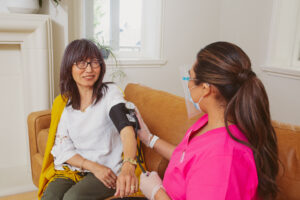How to Decide Between the Different Types of Caregivers for Your Loved One
Knowing the different types of caregivers and which is best suited for you and your family can be challenging. There are many types of caregivers out there, and being able to decipher the various types can be daunting.
All caregivers have a common goal of helping others, but their caregiving methods for others could differ. There are a wide variety of caregiver roles covering a wide range of specialties and needs.
In this article, we’ve broken down the various types of caregivers, from specialized independent caregivers to caregivers that work part of a team—many offer specific skills and assistance in different living facilities, nursing homes, and even in someone’s residence.

In-Home Caregivers
In-home caregivers provide a popular care service administered in someone’s personal home.
This type of care is one of the best alternatives to assisted living facilities or nursing homes. Hiring in-home caregivers is an excellent way for an individual to get support at home as often or as little as needed.
Depending on the level of care necessary, in-home caregivers can vary in scope of practice and specialty. Many in-home caregivers can also have varying levels of training, including nursing certifications, nursing diplomas, and degrees.
Many people feel overwhelmed when hiring a caregiver for in-home help. We’ve simplified the process HERE, so you don’t need to worry.
If you don’t know which caregiver is the best suited for you, we’ve broken down the different types of in-home caregivers:
1. Independent Caregivers
An independent caregiver is a caregiver who provides care to an individual at home.
They are employed directly by the individual needing care or hired by their family. Independent caregivers do not work for an agency like Nurse Next Door; they work as independent contractors.
2. Family Caregivers
Family caregivers are essential people doing crucial jobs.
They are usually a family member or friend of the individual needing care. Many family caregivers are unpaid and do the work out of love.
A spouse, grandchild, neighbor, or friend may all become a family caregiver at some point in their lives. Several family members might pitch in to help, or an entire family may house their loved one who needs ongoing care and support.
These caregivers spend a lot of time looking after their loved ones full-time or part-time. Occasionally, full-time family caregivers could face challenges like burnout, stress, or scheduling conflicts while providing care. Programs like respite care can help family caregivers take a break from their care duties and recharge.

3. Private-Duty Caregivers
Private-duty caregivers are caregivers that provide in-home care.
They either work independently or for an agency like Nurse Next Door. A private duty caregiver can provide a broad range of services, from medical and nursing care to assistance with personal and daily tasks.
4. Professional Caregivers
Professional caregivers provide medical or non-medical care in a client’s home, assisted living facilities, or nursing homes.
They work independently or for an agency like Nurse Next Door and have a common goal of helping others, especially seniors, live in their homes for as long as possible.
Many professional caregivers possess one or more of these professional designations:
- First Aid and CPR
- Certified Nursing Assistant
- Health Care Aide/Home Health Aide
- Licensed Practical Nurse
- Registered Nurse
5. Volunteer Caregivers
Volunteer caregivers work either in respite or hospice care.
Respite care is a service that gives short-term relief to primary caregivers. Hospice care, on the other hand, focuses on the quality of life through comforting and caring for someone approaching the end of life.
Volunteer caregivers provide volunteer non-medical companionship, supervised care, and assist families with comforting their loved ones.
6. Non-medical In-Home Caregivers
Non-medical types of caregivers could be professionally trained as Certified Nursing Assistants (CNAs), Licensed Practical Nurses (LPNs), or Registered Nurses (RNs), depending on local regulations.
Many non-medical caregivers assist with non-medical daily living activities like:
- Meal preparation
- Light housekeeping
- Dressing
- Bathing
- Toileting

These caregivers can work full-time, part-time, or even provide respite care for family caregivers who need to take care of themselves. They can also work as companions, keeping their clients company.
Other Types of Caregivers
If in-home care isn’t the right fit for your loved ones, other types of caregivers can provide the care you need in a different setting.
Other types of caregivers can provide specific services designed for different kinds of illnesses and care needs.
Adult Daycare Centers: are typically non-residential facilities that support the health, nutritional, social, and daily living needs of adults in a professionally staffed group setting [01].
Adult daycare centers can assist seniors and adults with disabilities to continue to live in their own homes by providing supportive group programs and activities in the community during the day.
Nursing Homes: are residential care facilities for seniors needing medical care or individuals with disabilities.
Residents of nursing homes typically have complex medical needs that require full-time care beyond what an assisted living facility can provide. Nursing homes provide full-time care to individuals needing it. They may be referred to as skilled nursing facilities, long-term care facilities, care homes, or rest homes.
Assisted Living Facilities: primarily provide personal care in a home-like social setting.
Assisted living facilities offer housing, hospitality, and personal care services for adults who can live independently and make their own decisions but still require a supportive environment due to physical and functional health challenges.
Virtual Caregivers: can be family members or professional caregivers overseeing an individual’s health.
Technology has allowed delivering care virtually. For individuals who cannot receive physical care, families can now stay involved with the health of their loved ones through virtual technology.
Hospice Caregivers: are caregivers who help someone nearing the end of life which requires additional support. A hospice caregiver usually does not have medical training but provides companionship and personal care to individuals who are palliative or in hospice.
Should a family need extra support in caring for their family member, hospice caregivers can step in and assist. A hospice caregiver has caring qualities and assists a family through this difficult time. Many hospice caregivers spend hours accompanying the individual and helping the family in any way they can. [02]

Caregivers are extremely important people doing incredible jobs helping others. At Nurse Next Door, we have different types of caregivers that help with a range of in-home care services.
If you don’t know where to begin or which caregiver is the best suited for you or your loved one, give us a call for a FREE Caring Consult. One of our Care Designers can meet with you virtually or in the comfort of your home to discuss your care needs, address concerns, and create a tailored care plan.
Get Started with Nurse Next Door and visit our senior home careservices here or
call 1-877-588-8609 today!
What People Are Saying About Nurse Next Door’s Caregivers:
“A place where nice people care for those brave souls combating illnesses and old age. Caring and advocating for those who can’t. A professional outfit. Wow!!!” – Gilles Lescure
“A very helpful staff. Highly trained assistance. Punctual and kind care service. A five-star and excellent service. I highly recommend.” – Bella Ferrer

